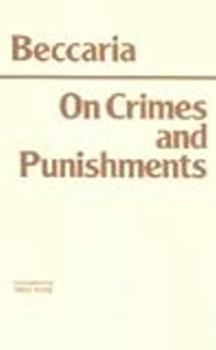On Crimes and Punishments
(Part of the Cambridge Texts in the History of Political Thought Series)
Select Format
Select Condition 
Book Overview
On Crimes and Punishments is a seminal treatise on legal reform written by the Italian philosopher and thinker Cesare Beccaria between 1763 and 1764. The essays proposed many reforms for the criminal... This description may be from another edition of this product.
Format:Paperback
Language:English
ISBN:0915145979
ISBN13:9780915145973
Release Date:November 1986
Publisher:Hackett Publishing Company
Length:128 Pages
Weight:0.10 lbs.
Dimensions:22.2" x 5.4" x 8.5"
Customer Reviews
5 ratings
Consider Machiavelli Versus Beccaria! A Comparative Look...
Published by Thriftbooks.com User , 15 years ago
The Prince by Machiavelli Versus An Essay on Crimes and Punishments by Cesare Beccaria Two men, living hundreds of years apart, in many ways, wrote with parallel opinions and conclusions. Most well known is Machiavelli's The Prince; however, in many ways, the greater impact came from lesser known Cesare Beccaria, with An Essay on Crimes and Punishments--the latter being the basis upon which much of governments and laws have been established. Both men emphasized that the virtue of man should be the basis of our interpersonal actions. Yet they also conceded that man's seemingly instinctual appetite for power prevents that base virtue from ruling our decisions. Given the continued use of military might of one country against another, it is abundantly clear that what Machiavelli wrote in the 15th century and Beccaria wrote in the 18th continues to hold true today. The Prince was written based upon Machiavelli's observations and analysis of what was happening in his country. His books resulted in his recognition as the founder of political science inasmuch as he was the first to analyze various forms of government. Many of us may also observe, perhaps evaluate and analyze, and come to the conclusion that somebody has to do something. Machiavelli, in writing The Prince did just that. He wrote and sent his treatise directly to Lorenzo De Medici, Duke of Urbino...as a token of his service. Throughout The Prince Machiavelli constantly refers to the virtues needed to be an effective leader, an effective prince. At the same time, he looks at what actually happened, using events of those days, and effectively explained what was done right or wrong. "So it is that to know the nature of a people, one needs to be a Prince; to know the nature of a Prince, one needs to be of the people." (back cover) Proceeding on, he explained "The main fundamentals that a state...has to have are good laws and a strong army. Good laws do not come without strong security; where the army is strong, one needs good laws." The Prince, p. 76. One might say that it is on this point that Beccaria started. "In every human society, there is an effort continually tending to confer on one part the height of power and happiness and to reduce the other to the extreme of weakness and misery. The intent of good laws is to oppose this effort and to diffuse their influence universally and equally." (Introduction) Let's further compare some of the specifics that these two great political scientists wrote, although it should always be remembered that Machiavelli wrote for a specific purpose at a specific time. Beccaria, on the other hand, had a broader history to evaluate and some semblance of lawmaking had already begun. · There are two ways to fight: one with laws, the other with force. The first is rightly man's way; the second, the way of beasts. --Machiavelli · Every act of authority of one man over another, for which there is no absolute necessity, is tyrannical. --Beccaria · The in
On Crimes and Punishment
Published by Thriftbooks.com User , 15 years ago
This is a foundational building block in the field of criminology and a must have for any library.
A comforting read
Published by Thriftbooks.com User , 23 years ago
Reading Beccaria's masterpiece was truly comforting, in a sense in which more recent works are not. In a world where increasing numbers of people are in favor of the death penalty, and where the rights of the person under trial sometimes don't seem to matter, this rational, lucid and yet quietly compassionate book was a worthwhile read. Its enlightened, ingenious and sometimes colloquial way of presenting arguments is even more satisfying when you place the book in its historical context (Beccaria's ideas were truly revolutionary by the time's standards) and learn that, after it was published, many works were written in reply to it, defending and trying to morally justify the use of torture in judicial proceedings. You should read this essay in order to fully grasp this great leap in the history of juridical thought and philosophy.
Law with Human Faces
Published by Thriftbooks.com User , 24 years ago
Originally published in 1764 anonymously,this essay is a lucid sprit of laws by a young enlightened Italian.His rational argument is based on humanism with anti-clerical and anti-despotic tendencies,which is so convincing and has been proved influential on the reformist movements. Before reading this work, I was nearly ignorant of the ancien regime realities.Thanks to it,the situations and struggles of people in those days have been more clearly revealed to me.
Freedom and Democracy
Published by Thriftbooks.com User , 24 years ago
This is an excellent translation of Beccaria's masterwork. The phrasing is clear and unaffected; and the format is pleasant and well-disposed. An Essay on Crimes and Punishments is one of the greatest treatises in the democratic tradition, a testament to human freedom and social justice. For students of law or political theory (of which I am one) this is an excellent account of some of the fundamental principles of democratic society and jurisprudence. Anyone who holds public office should be forced to read this book at gunpoint.






